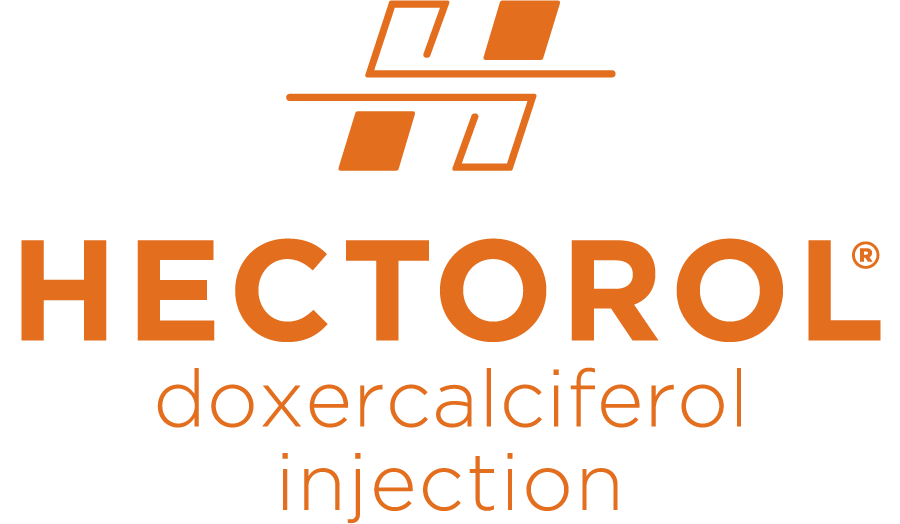HECTOROL® (doxercalciferol) injection
Indication
-
HECTOROL injection is indicated for the treatment of secondary hyperparathyroidism in adult patients with CKD on dialysis.
Important Safety Information
Contraindications
-
Hectorol is contraindicated in patients with hypercalcemia or vitamin D toxicity.
- Hectorol is contraindicated in patients with known hypersensitivity to doxercalciferol or any of its inactive ingredients.
Warnings and Precautions
-
Hypercalcemia can occur during Hectorol treatment and can lead to cardiac arrhythmias and seizures. Severe hypercalcemia may require emergency attention. Concomitant use of high dose calcium, thiazide diuretics or vitaminD may increase the risk of hypercalcemia. Monitor serum calcium before initiating therapy and during treatment with Hectorol and adjust dose accordingly. Inform patients about the symptoms of elevated calcium (feeling tired, difficulty thinking clearly, loss of appetite, nausea, vomiting, constipation, increased thirst, increased urination and weight loss) and instruct them to report new or worsening symptoms when they occur.
-
Hypercalcemia increases the risk of digitalis toxicity. In patients using digitalis compounds, monitor serum calcium and patients for signs and symptoms of digitalis toxicity. Increase frequency of monitoring when initiating or adjusting the dose of HECTOROL.
-
Anaphylaxis with symptoms of angioedema, hypotension, unresponsiveness, chest discomfort, shortness of breath, and cardiopulmonary arrest has been reported in hemodialysis patients after administration of HECTOROL. Monitor patients upon treatment initiation for hypersensitivity reactions. Should a reaction occur, discontinue and treat.
-
Adynamic bone disease may develop and increase the risk of fractures if intact parathyroid hormone (iPTH) levels are suppressed to abnormally low levels. Monitor iPTH levels to avoid oversuppression and adjust dose if needed.
Patient Monitoring
-
For patients with CKD on dialysis monitor serum calcium, phosphorus, and iPTH levels weekly after initiation of therapy or dose adjustment.
Adverse Events
-
The most common adverse events reported by ≥5% of the Hectorol-treated dialysis patients included edema, headache, malaise, edema, nausea/vomiting, dyspnea, dizziness, pruritusand bradycardia.
Drug Interactions
-
Cytochrome P450 inhibitors: Formation of the active doxercalciferol moiety may be hindered and may necessitate dosage adjustment. Monitor intact PTH and serum calcium concentrations closely.
-
Enzyme inducers: Formation of the active doxercalciferol moiety may be affected and may necessitate dosage adjustment. Monitor intact PTH and serum calcium concentrations closely.
-
Magnesium-containing products: Combined use may cause hypermagnesemia. Monitor serum magnesium concentrations more frequently and adjust dose as needed.
Special Populations
-
This drug should be used during pregnancy only if clearly needed.
-
Nursing mothers should discontinue nursing or discontinue the drug, taking into account the importance of the drug to the mother. Infants exposed to HECTOROL through breast milk should be monitored for signs and symptoms of hypercalcemia.
-
Patients with hepatic impairment may not metabolize HECTOROL appropriately. More frequent monitoring of intact PTH, calcium, and phosphorus levels should be done in patients with hepatic impairment.
Please click here for Hectorol Injection Full Prescribing Information.
Click here to learn more about Sanofi's commitment to fighting counterfeit drugs


